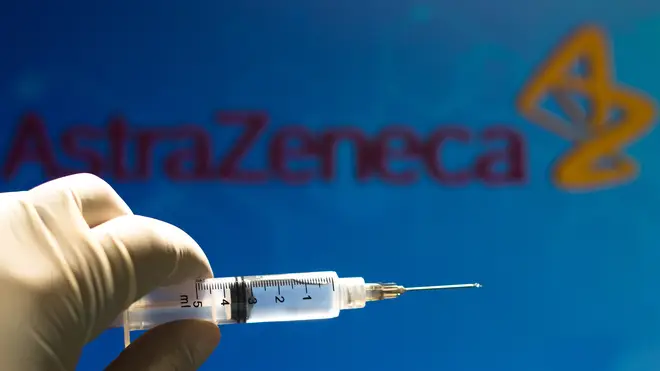
James O'Brien 10am - 1pm
21 November 2020, 06:31 | Updated: 21 November 2020, 11:13

The UK will be the first country to begin clinical trials of a new coronavirus antibody treatment developed by drugs giant AstraZeneca aimed at people with a weakened immune system who cannot be vaccinated.
A participant in Manchester will be the first in the world to receive the pharmaceutical company's new "antibody cocktail" as part of the trial to test whether it will prevent Covid-19 for up to a year.
Read more: Vaccine roll out will start next month if Pfizer Covid-19 drug is approved
Read more: Over 50s to be offered free flu vaccine to fight 'twin threat' with Covid-19
The clinical trial programme will recruit 5,000 participants, which includes 1,000 people from nine sites in the UK.
The aim of the trial is to evaluate the safety and effectiveness of a combination of two long-acting monoclonal antibodies - man-made proteins that act like natural human antibodies in the immune system.

LBC's Ben Kentish grills Matt Hancock during Downing Street press conference
Sir Mene Pangalos, executive vice president of biopharmaceuticals R&D at AstraZeneca, said the treatment, which can be injected or administered intravenously, is aimed at those who have a weakened immune system and cannot be vaccinated.
The injections will also target those who are unlikely to respond to immunisation - which may include hundreds of thousands people across the country.
He said: "There is going to be a significant number of people - even in a world where vaccines are highly effective - who will not respond to vaccines, or in fact will not take vaccines.
"So having monoclonal antibodies as potential therapeutics is also important."
Read more: Jonathan Van-Tam: No 'magical number' of days to allow Christmas gatherings
Read more: UK R number drops slightly to between 1 and 1.1
The UK Government has an in-principle agreement to secure access to one million doses of the antibody combination, dubbed AZD7442, if it is successful in the phase three trials.
The trial aims to enrol adults who are at increased risk of Covid-19 infection or who are more likely to have an inadequate response to vaccination, and will include people from health care and care home settings.
Sir Mene said: "We need people to sign up to this [trial], particularly those vulnerable people over 60 who are immuno-suppressed, and may be at higher risk of developing severe disease."

WHO warns it will be a 'different Christmas' this year
Initial results from the randomised control trial are expected to be published in the first half of 2021, although the trial is expected to last for 12 months.
Kate Bingham, chairwoman of the UK's Vaccine Taskforce, said: "This is part of the portfolio to protect the whole UK.
"So, obviously, vaccines work in people who have a functional immune system.
"[But] if you are immuno-suppressed and you are going through bone marrow transplants, or indications or treatments that actually reduce your ability to mount an immune response, then this is basically the only current way of providing that short-term passive immunity.
"So we are absolutely looking to protect those people who are immuno-suppressed or those people who need immediate protection, because you will remember that vaccines typically take about six weeks to work."
Read more: Nicola Sturgeon 'utterly scunnered' by new Covid restrictions imposed to ease Xmas
Read more: Foreign healthcare worker visas extended for another six months for free
She said the NHS Vaccine Research Registry - a list of 340,000 volunteers willing to go into clinical trials - will provide some patients for the trial.
Sir Mene said the two antibodies have been engineered with a life-extension technology to make them effective for a longer period of time.
He said: "We think they will confer protection for between six, but more likely closer to 12 months, which makes them in effect, almost like a passive vaccination."
Whilst it is unclear how much the antibody treatment will cost, Sir Mene said it will be "more expensive than vaccines", but added "we hope to make it cost effective".